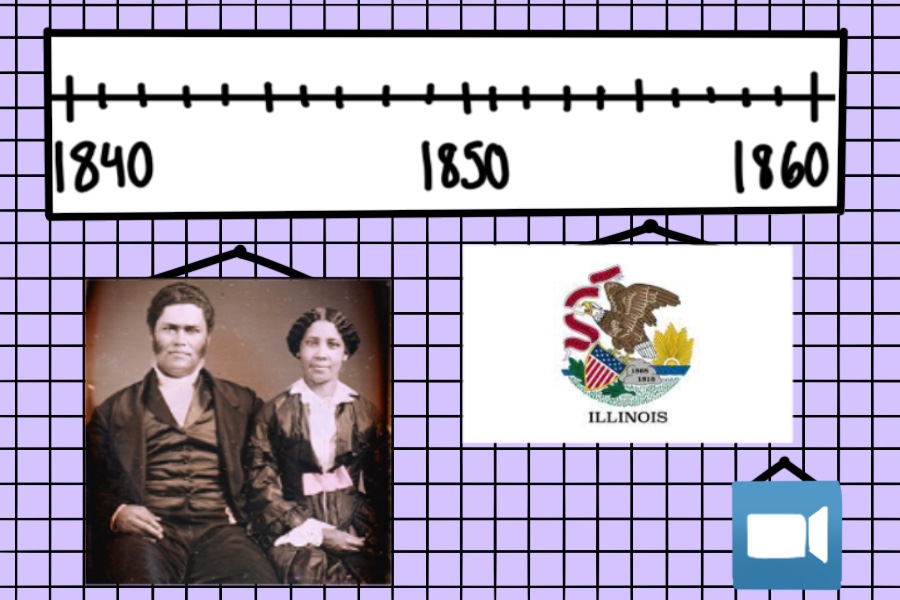Faculty, students launch web exhibit covering Black organizing in pre-Civil War Illinois
A new web exhibit covers Black organizing in pre-Civil War Illinois.
March 1, 2022
Northwestern faculty, staff and students launched the web exhibit “Black Organizing in Pre-Civil War Illinois: Creating Community, Demanding Justice” Tuesday and hosted an opening celebratory event in Kresge.
“When we think of the 1840s, ‘50s and ‘60s in Illinois, many people probably envision Abraham Lincoln and his rise to the presidency,” said History Prof. Kate Masur, the project’s director. “My sense is that few people know or teach about the Illinois Black Laws, which tried to discourage and even completely prohibit black migration into the state in the same period.”
The team began working on the project about three years ago, seeking to showcase Black stories as Illinois tried to repress, marginalize and exclude them, Masur said. The web exhibit covers topics ranging from Black life in antebellum Illinois to Black protests and churches during the mid-1850s.
Masur worked with Josh Honn, the digital humanities librarian, and Matthew Taylor, the director of the media and design studio. The project’s research came from graduate and undergraduate students who profiled influential Black figures and covered major events.
“With this exhibit, we become part of the broader projects of bringing (Black) stories to light, making them available in an accessible way so we can know them, learn from them, make them part of our broader narratives of the history of this state and the nation,” Masur said.
The project encompassed digital humanities, which incorporates research and publishing with technology, as a major pillar for exhibiting these rare stories, Honn said. The creators of the exhibit played with web design and interactive visualizations.
Honn said this type of digital humanities mirrors Black organizing, going beyond publishing to pass on “pedagogy, knowledge, efforts, skills and stories” in an effort to create better futures. He said they worked with the Colored Conventions Project to establish deep levels of knowledge in the Black history they researched.
“Students don’t simply learn, for instance, who owns the photograph, but how to steward the memory found in it,” Honn said. “The work to create an inclusive and engaging pedagogy that can be applied in classrooms across the country is a truly unique and important feat that I hope continues to be honored and emulated in the field of digital humanities.”
Some students, like fourth-year history Ph.D. student Mikala Stokes, shared their experiences working on the project. Working with second-year history Ph.D. student Marquis Taylor, Stokes researched The Illinois Colored Convention of 1853, which sought to counter the Illinois Black laws.
Stokes said establishing a collaborative environment with Taylor benefitted her learning. She said the collaborative nature of the project also helped her, especially because the pandemic made most research operations remote.
“The convention in Chicago was one about claiming American-ness … the 1853 Black Law that prevented future migration of African Americans into Illinois violated the principles of the freedom of movement.” Stokes said. “These are deeply entrenched American principles. And they violated those for African Americans.”
Weinberg juniors Valeria Lira-Ruelas and Shira Nash worked together to compile profiles of delegates who attended the 1853 convention. Lira-Ruelas said these profiles were particularly difficult because there was insufficient or conflicting information.
Lira-Ruelas said the two worked together to smooth out inconsistencies and created narratives centered around the Black experience. Raised in a “predominantly Black and brown” community in Northern Illinois, she added the project altered her understanding of her community’s history.
“Black organizing was and continues to be incredibly powerful and inspiring,” Lira-Ruelas said. “It played a critical role in the Civil War and the abolishment of slavery and I can’t help but be disappointed by my past education for not emphasizing this critical aspect of American history.”
Email: joannahou2025@u.northwestern.edu
Twitter: @joannah_11
Related Stories:
— NU College Democrats hosts former NYC mayoral candidate Maya Wiley
— Northwestern alum discusses experiences traveling abroad as a Haitian American
— From civil rights attorney to prosecutor: Laura Coates discusses advocacy in the courtroom



